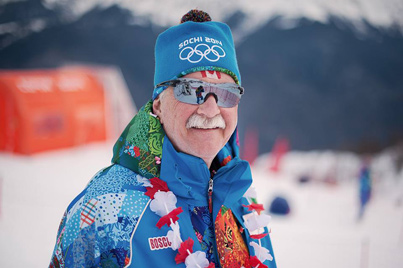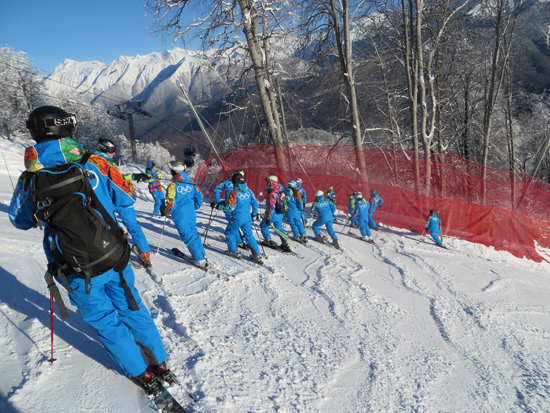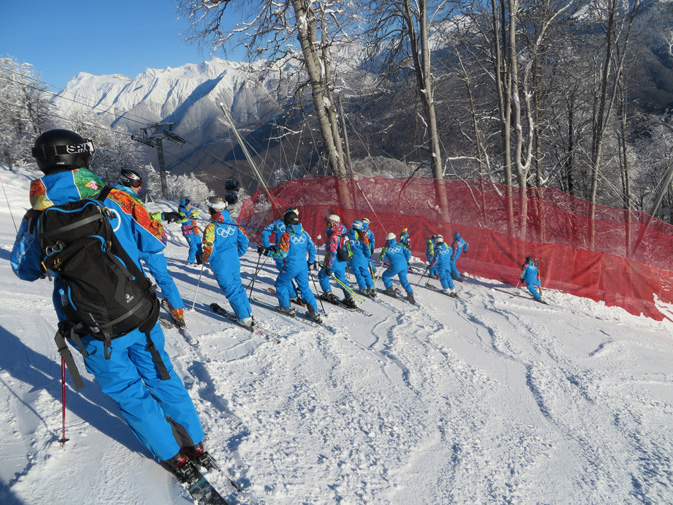 In the last few days we had great weather, sunny and cold, and the track is frozen from top to bottom. If this continues, the downhill tracks will be spectacular. The views of the Caucasus Mountains are incredible.
In the last few days we had great weather, sunny and cold, and the track is frozen from top to bottom. If this continues, the downhill tracks will be spectacular. The views of the Caucasus Mountains are incredible.
Across the valley is the Laura Cross-Country Ski & Biathalon Centre. This venue is at 1,700 metres, the maximum altitude allowed for these events. The venue where I am, the Rosa Khutor, not only holds the alpine skiing race but all the other alpine sports on different parts of the mountain. This gives you an idea of how huge this place is.
The pace for preparation for the Olympics is picking up. There are more volunteers and athletes still arriving. The workmen are putting last minute touches to buildings, streets and other site-specific places. There are also plenty of shops that are about to open.
With the number of armed policemen increasing, you can see how busy it’s becoming. A special surveillance dirigible is suspended over the venues and is being held by a steel cable. I believe this dirigible (all top secret) has high definition cameras, heat sensitive vision and other advanced tools. The networks are moving in with dozens of broadcast trailers and equipment.
Yesterday, as I was skiing through the finish area, I noticed folks were practicing for the flower presentation ceremonies. Most of you know that immediately after an event, the podium winners are introduced and presented with flowers. The actual Olympic medals are not presented until later in the evening.
The beauty of this event as volunteers is you get to know more about fellow volunteers and their personal lives. My roommates for example:
- Two Italian gentlemen. One is a retiree who lives in Milan, and the other lives in Venice and commutes to work by water taxi. He happens to own a travel agency that helps volunteers get to major international events.
- One Russian gentleman is a retired Red Army officer. The other is studying to be a pilot and is planning to go to Florida to complete his airline pilot’s training.
- The Bulgarian gentleman is a fire fighter and is also a FIS Technical delegate.
This is truly an international event for volunteers. To date I have met and worked with folks from Russia, Norway, Sweden, the U.S., France, UK, Italy, Bulgaria, South Africa, Japan, Korea, Austria, Switzerland and Germany. And I know there are folks from other countries that I have not yet met.
In the volunteer lunch tent there are two maps, one of Russia and the other of the rest of the world. Folks are asked to stick a pin to identify their hometown. The majority of volunteers, close to 80%, are under 23 years of age. About 5% of the volunteers are over 50, and before anyone thinks it, I am not the oldest! I met two gentlemen in their early 70s who are course workers in cross-country skiing.
 Because of the good weather, work on the downhill tracks is progressing well. The B nets and air fences being installed are all good, mostly new equipment. Prior to this, the weather was not cooperating. We had rain on the bottom third of the track, wet snow half-way up, with one metre of fresh snow on top. This meant lots of extra re-work and especially hosing down and re-working the pitches with snow cats.
Because of the good weather, work on the downhill tracks is progressing well. The B nets and air fences being installed are all good, mostly new equipment. Prior to this, the weather was not cooperating. We had rain on the bottom third of the track, wet snow half-way up, with one metre of fresh snow on top. This meant lots of extra re-work and especially hosing down and re-working the pitches with snow cats.
Rosa Khutor has the latest in snowmaking technology. The Russians wanted to ensure they had snow, plus from the end of last year’s winter they had huge piles of snow covered in insulated blankets. They have over 427 snow-making guns, most of which can be remotely operated. There should be no concern as the ski area has received over three metres of snow in some spots. The mountain itself has avalanche risks, so the Russians installed propane-fired Gasex cannons that can be fired remotely. They spared no expense.
Most of the dialogue is in Russian. Even though I took two years of lessons, I find it very difficult to understand as folks speak very fast. I can read Russian but my ‘ear’ is not developed enough to pick up the different tones and inflections. Probably after three weeks here it will get better. As a result there is a gap in communications and non-Russian speakers are behind the eight ball when it comes to communication and what is going on with respect to course work.
Last night I ran into Todd Brooker. We had met a few times when I was with
Alpine Canada. Todd will be covering alpine ski racing for NBC.
Trouble is Brewing
When I was working at the Olympic test events last year, I noted the Russian Ski Federation members had issues with their role as non-team players and non-leaders. Well, they are back and already there is conflict between International volunteers and the RSF’s supposed ‘judges’ or ‘professionals’. More in my next update.
A Good Heart-Warming Story
We have plenty of time to chat with other volunteers and recently I spoke to a young gal from France. Her name was Aniya – not a typical French name. She gladly told me her story: she was adopted from a Russian orphanage when she was eight.
We have all seen news clips of orphanage homes with babies literally abandoned in their cribs; too many babies/children, not enough nurses/caregivers and not enough parents who want to adopt.
Aniya was adopted by folks who live in Poitiers, France, a French father and an American mother. Now in her mid-twenties and raised by loving parents, she has completed university. Her parents have a chalet in Chamonix and she is a former racer-ski instructor. She now has an American and French passport. She has since made contact with her birth mother.
She still remembers some Russian but not enough to get by. She has plans to meet with her birth mother and as she was born in Russia she will obtain a Russian passport as well. I asked her, do you know how lucky you are with your life now compared to what it would have been had you not been adopted by these great folks you now have as parents? Tears welled up in her eyes and she said a heartfelt “yes!”

